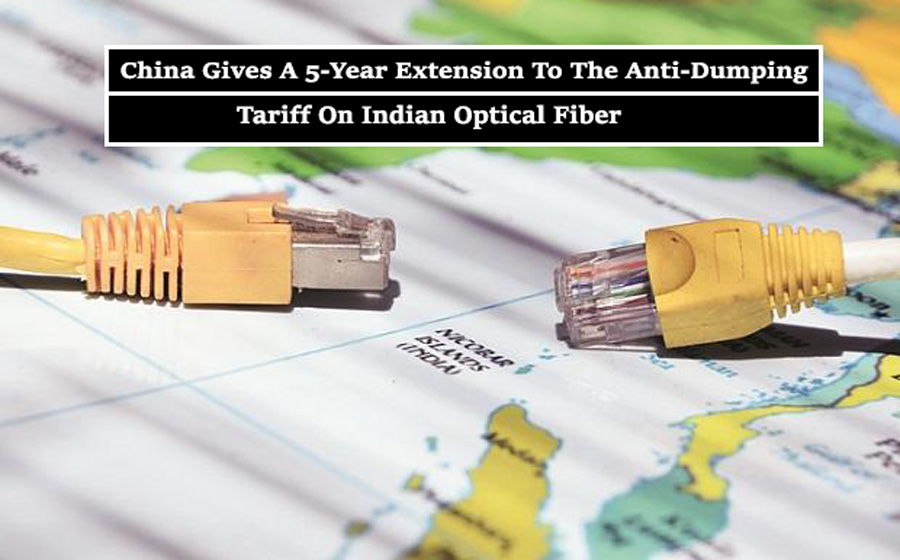
Anti-dumping duty is a tariff that is imposed on imports developed in foreign countries that are priced below the fair market value of similar goods in the domestic market. The government imposes anti-dumping duty on foreign imports when it believes that the goods are being “dumped” via the low pricing in the domestic market. The anti-dumping is imposes to protect the local businesses and markets from unfair competition by foreign imports.
China has extended an anti-dumping tariff on the optical fiber that is made in India, the commerce ministry said in a notice that is published on its website on Thursday. The duties will be renewed from Friday and remain in place for five years.
In the announcement, the MOFCOM has decided to continue to impose anti-dumping duties on the imported single-mode optical fibers originating in India from August 14 on the behalf of the final review of the investigation results. The implementation period is 5 years.
Various Indian companies were named in the recent announcement and the ministry defined single-mode fiber which only transmits single-mode optical signals within a certain wavelength range. The ministry said, penalizing tariffs on the single-mode optical fiber takes effect from August 14 and lasts for the five years, with the tariffs ranging between 7.4 percent and 30.6 percent depends on the specific Indian manufacturers.
The extension of the anti-dumping duties comes in the backdrop of the current Sino-India border tension at Line of Actual Control in the Eastern Ladakh and the cooling of the bilateral economic fixes.
“The decision came after MOFCOM calculated the possible damage to the Chinese industries if anti-dumping measures are terminated, at the request of the domestic single-mode optical fiber industry on 13 August 2019. State media reported. The Commerce Ministry started to implement the anti-dumping measures on the single-mode optical fibers import from India in August 2014.
In June 2019, the MOFCOM initiated the final review investigation in response to a domestic industry application, the announcement said. The Chinese ministry ruled if the anti-dumping measures were terminated. The dumping of imported single-mode optical fibers originated in India to China might continue or recur, and the damage to China’s domestic industries might recur or continue.
Role of the WTO in Regulating Anti-Dumping Measures
The World Trade Organization plays a significant role in the regulation of anti-dumping measures. As an international organization, the WTO doesn’t regulate the firms accused of engaging in the dumping activities but it posses the power to regulate how governments react to the dumping activities in their territories.
Some government sometimes react unkindly to foreign companies engaging in dumping activities by introducing punitive anti-dumping duties on foreign imports, and the WTO might come in to decide if the actions are genuine, or if they go against the WTO free-market principle.
According to the WTO Anti-Dumping Agreement, dumping is legal unless it threatens to cause material injury in the importing country domestic market. Additionally, the organization prohibits dumping when the action causes material retardation in the domestic market.
Where dumping occurs, the WTO allows the government of the affected country to take legal action against the dumping country as long as there is evidence of genuine material injury to industries in the domestic market. The government must show that dumping took place, the extent of the dumping in terms of costs, and the injury or threat to cause in injury to the domestic market.
Calculating the Anti-Dumping Duty
The WTO Anti-Dumping Agreement allows governments to act in a way that doesn’t separate between trading partners and honors the DATT 1994 principle when measuring the duty. The GATT 1994 principle provides a number of guidelines to govern trade between members of the WTO. It requires that imported goods not be subjected to internal taxes in excess of the costs imposed on domestic goods.
Also, it requires that imported goods be treated the same way as domestic goods under domestic laws and regulations. Although it allows the government to impose a duty on foreign imports if they go beyond the rates and threaten to cause injury to the domestic market. There are various ways of deciding whether an imported product has been dumped heavily or lightly, and the amount of duty to be applied. The first method is to calculate the anti-dumping duty based on the normal price of the product.
The second alternative is to use the price charged on the same product but in a different country. The last alternative is to calculate the duty based on the total product costs, expenses, and profit margins of the manufacturer.
The Chinese order comes three days just after India sought to impose provisional anti-dumping duty on imports of black toner in powder form originating in or exported from Malaysia, China, and Taiwan for six months, a government order issued on Monday said.







